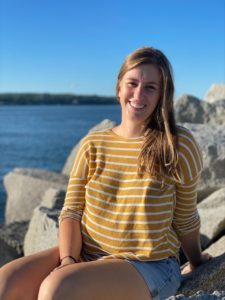 Hannah Crawford shares her Northeastern experience in the Master of Science in Environmental Science and Policy program, one of our professional master’s program offerings.
Hannah Crawford shares her Northeastern experience in the Master of Science in Environmental Science and Policy program, one of our professional master’s program offerings.
Q: Why did you decide to enroll at Northeastern University and pursue this degree?
I decided to enroll here because of the true mixture of environmental science and environmental policy, enabling me to tailor the program specifically to my goals. I also wanted the opportunity to co-op with organizations in the environmental field, as that isn’t an option in other graduate programs. I was not interested in doing a thesis but instead having hands-on experience with people tackling current climate change issues.
Q: Tell us about your experience with this program so far.
I started the program in January 2021, and I was one of the few students who decided to come to campus for class to form relationships with my professors and learn in person, which is my preferred method. Since then, I have connected easily with multiple professors in my program, and now I am co-oping with my dream organization. Everyone has been extremely friendly and helpful in whatever endeavor I am pursuing.
Q: What has been your favorite part?
My favorite part has been meeting up with people from my cohort to bond, take a break from class, and network. We have hiked and met up in different places downtown, like the Boston Commons.
Q: Are there any particular faculty or resources that have helped you succeed in this program?
Talk with your professors and connect with them on LinkedIn. They have infinite resources, suggestions, and connections that will make the next step in your career easier than trying to figure it out on your own.
Q: Tell us about your experience on co-op at The Nature Conservancy (TNC).
I am halfway through my co-op, and I love it! I connect and collaborate with people working in the field and leadership, like directors of TNC’s MA chapter. The projects I’m working on are diverse in skill, from writing grants, educational documents, literature reviews, and outreach letters, to using GIS and doing site visits to potential TNC project locations. This opportunity will significantly enhance my resume and future career path.
Q: How has your experience at Northeastern prepared you for a professional career?
All of my classes at Northeastern have focused on discussing current and complex issues in the environmental world that I wouldn’t have known about or previously discussed in past jobs. I have also been able to hone in on perfecting my resume, cover letter, and interviewing skills.
Q: Which skills have you learned from your program that have proven most useful during a co-op or that you think will be helpful to you during a future job search?
One thing that stands out to me is the knowledge of social-ecological systems and current environmental policies.
Q: What are your post-graduation plans?
I plan to work for a large nonprofit as a climate adaptation scientist who works with local communities to build resiliency towards climate change. I particularly enjoy projects that highlight building up a community and biodiversity simultaneously.
Q: Do you have any advice for graduate students looking for work experience in similar fields?
Connect with students, professors, and guest speakers on LinkedIn. You never know how they may help you in the future. Don’t be afraid to reach out to people with access to opportunities; the worst thing that could happen is a no or no response. Take classes that will give you skills you see listed in dream jobs (GIS is always a plus!). Have multiple people look at your resume because they will all have different advice. When looking for jobs, don’t just think about the duties but what kind of work environment is best for you. Lastly, have fun being a graduate student! A lot of the work takes time and is serious so go to the fun bonding events to relax and make lifelong friends.
Marine and Environmental Sciences

